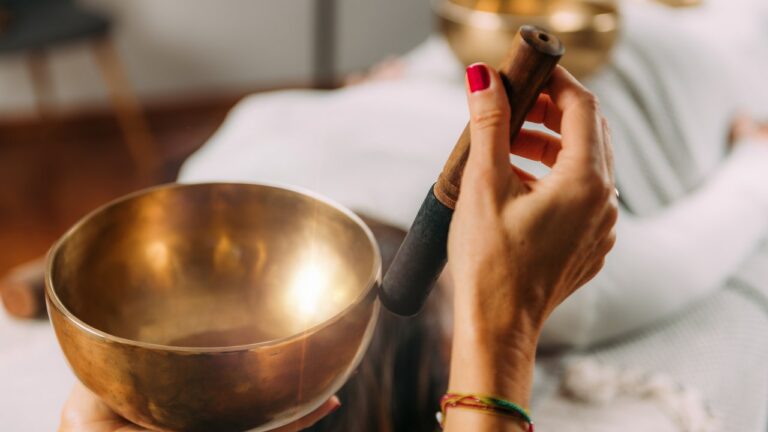
[ad_1]
“You have a certain song on your playlist that really can move you, right? Like it can switch you from one thing to another inside emotionally,” Vinny Colandrea, a sound practitioner at My Zen Den in Beacon, New York, says. “So on some level, we all recognize the power of sound.”
Tools of the Trade: Instruments Often Used in Sound Baths
Sound baths use repetitive notes at different frequencies to help bring your focus away from your thoughts. “I always call [the instruments] a doorway into the present moment,” Colandrea says. “One of the things that brings you into the present moment is dialing into your sensory perception; if you’re seeing [or hearing] something beautiful, that can bring you into the present.”
Typically, these sounds are created using traditional crystal bowls, gemstone bowls, cymbals, gongs, bells, rainsticks or tuning fork chimes. What instruments are used is completely up to the practitioner, but Auster notes that it’s not just about how the instruments sound — it’s also about the sounds’ frequencies.
“Each frequency has a healing potential, and when combined, can create what is called binaural beats that when processed by the mind can help entrain the brain and induce the brainwaves of the mind to organize to those synonymous with the subconscious state,” she says. According to the International Laboratory for Brain, Music and Sound Research, a binaural beat is a perceptual auditory illusion occurring when presenting two neighboring frequencies to each ear separately. Dr. Rabin further explains what happens when we hear these different frequencies at once: “When they are delivered in slightly different rhythms, this creates an interference pattern between the two rhythms that induces a third sound. This third sound is what people often refer to as the binaural beat.”
Dr. Rabin notes that there has been evidence supporting the benefits of binaural beats, especially when it comes to improving mediation practices. “Ultimately, what we see as in terms of effects on the brain, are that binaural beats impact a lot of parts of the brain. Not just the auditory cortex that receives information from sounds, but also it changes electrical signaling in the parts of the brain like the inferior colliculus, the midbrain, the brain stem, and our sensory, emotional, and frontal cortex,” he says. “All these parts of the brain are interacting together all the time.”
Auster continues to note that some key frequencies, known as solfeggio frequencies, have been used throughout history in sound healing to promote emotional shifts.
How a Sound Bath Works
Similar to a yoga class, each sound bath instructor has their own way of creating the flow of a session. After those participating get comfortable sitting or laying down, Colandrea likes to begin by creating a “push and pull” with the sounds of the instruments. For example, he may start off with instruments that are relaxing for 10 minutes, before transitioning to something that may build up tension. “It’s sort of my flow,” he says. “I try to create a journey through themes.”
[ad_2]